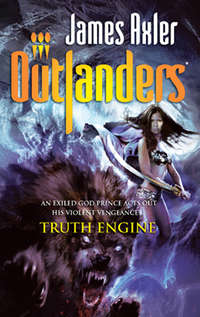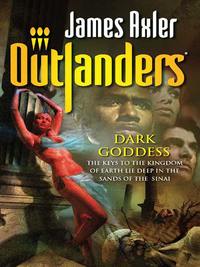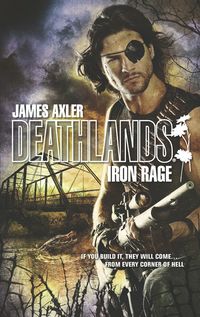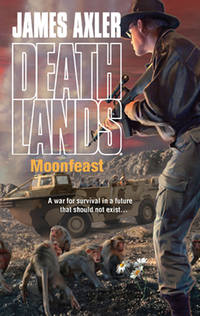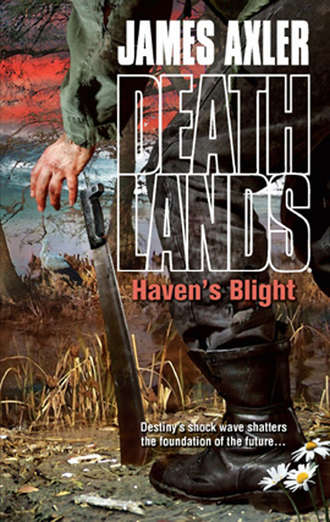
Полная версия
Haven's Blight
She burned through three of the 20-round magazines so fast they might have been strings of firecrackers. Though she also knew to shoot in short bursts the long black barrel quickly grew so hot the heat shimmer interfered with her sighting. Even on such gigantic targets.
“Give it a rest,” Isis suggested from right beside her. So focused had she become on her own shooting Krysty had been all but oblivious to the roar of the tall, lean woman’s own big Browning, and the muzzle-blasts that buffeted her like a stiff wind. “We don’t want to burn out the barrel. Or even have to take time to swap it out.”
Krysty nodded. She looked around. The Finagle was running back on a reciprocal course along their starboard side. Before view of any of the steam craft but its stacks and radio masts vanished behind the Egret’s cabin, Krysty saw Stork with his Gatling swiveling and blasting away as fast as his long, wiry legs could revolve the barrels.
Beyond the wake the steam boat left in the black water, topped with yellow foam, an object like an overturned whaleboat floated to the surface near the reeds of the far bank of the little lake. Red streamed down its blubbery sides. It was clearly dead.
But the death of one of their own only redoubled the aquatic muties’ fury. The Egret was suddenly torqued counterclockwise by simultaneous impacts at bow and stern.
Krysty heard Isis’s teeth grind. “Dammit!” the captain groaned as if in sympathy to the noises of the tortured hull. “Even if we wound the monsters fatally, most won’t die quick enough to help.”
Despite the fact she could still feel the heat from her BAR barrel on her skin, Krysty had to shoulder the heavy longblaster and open up again. She fired toward the port quarter, where a monster was charging, attempting to ram again. Some of the Egret’s crew joined in with fancy compound bows and crossbows, feathering the animal’s back like an elongated seagoing porcupine. Krysty’s powerful .30-06 slugs literally ripped bloody chunks out of the broad back.
The creature submerged before it struck, and Krysty staggered as the deck lurched beneath her bootsoles. The beast had clearly slammed against the keel in passing below, trying to break Egret’s back or turn her turtle.
Instead a huge basso roar of agony vibrated up through the very timbers of the former yacht. The mutie had succeeded in driving some of the arrows stuck in its hide deeper by hitting the boat. It was clearly in great pain.
As she popped another empty magazine from the BAR’s well and stooped to grab a new one from the rapidly dwindling stock in the messenger bag Isis had dropped at her feet, Krysty grimaced.
“I hate the thought of wounding them without killing them.” She was untroubled by killing when it was needful. To eat, or to prevent whatever you were chilling from chilling you—man or beast. But she deplored wanton killing.
And she abhorred cruelty. She’d seen more than enough of it, known her share of it. That was one of the reasons she loved Ryan as she did: he was never cruel, never inflicted pain for its own sake.
“Me, too,” Mildred said.
She had gone green. Despite the blood dripping from the gauze she’d hastily tied around her wounded thumb, she had kept up the fight. She was clumsily jamming a fresh 8-round spring clip into the top of her M-1 receiver, impaired by her wound.
“The Deathlands just seem to find something awful to throw at you every single day.”
A shout from the bow made Krysty look. The water around the Hope seemed to boil. As she watched in horror a mutie with a good head start rammed its blunt head into the rotor-ship’s hull just aft of the bowsprit.
She heard the crunch as wooden planks gave way.
Then she tensed as Ryan went over the rail, right on top of the gray back.
But the man hadn’t been knocked overboard to his death. Or at least he wasn’t giving in to Death. In an instant he had jumped up to stand with boots planted wide on the monstrous back, holding the panga with its long, heavy blade downward, both hands wrapped around the grip.
An enormous single-fluked tail whipped up out of the water as he plunged the blade almost to his hands in the creature’s flesh. A cascade of water surged over Ryan, momentarily hiding him from sight. Krysty’s heart almost stopped beating.
But the waters receded and she saw him still there, ripping his panga free, leaving a trail of gore in the heavy humid air as he cocked the weapon over his head again. She realized the splash had been produced by a reflex reaction to the pain of having the knife bite deep, more than any attempt to wash him off. Though she could barely believe it hadn’t, so violent had the wash of stinking dark-stained water been.
Three times more Ryan plunged his panga into the horror’s back. The beast backed away from the hole it had stove in the Hope’s hull. Its big blunt head snapped up, venting a squealing roar of pain and fury.
It dived with breathtaking speed. But like Jak, Ryan felt the creature’s muscles bunch in preparation. Clutching the panga in his teeth, he threw himself toward the rail of the damaged boat, flinging out a hand.
His fingers reached just short of the rail. Then a bone-white hand gripped his wrist, his other hand clamping on Jak’s wrist. Ryan’s boots thumped into the white hull. A moment later he was clambering over the rail, helped by a dozen hands, which shortly were clapping him on the back.
“Whew,” Mildred said explosively.
Krysty let loose the breath she’d unconsciously been holding, as well. “That man just doesn’t do anything that isn’t heart-stopping, does he?”
But Ryan was brushing off the Tech-nomads’ congratulations. He gestured angrily. From her vantage point on the ship, trailing the other now by no more than forty yards, Krysty could see what he meant with painful clarity.
A dozen or more of the monsters still beset the squadron. No matter how dramatic, everything the defenders had done had amounted to a pinprick. Nothing more.
With a snarl of disgust Isis threw down her own BAR. Its barrel was glowing red now. It was almost certainly ruined, burned out. More to the point the heat would have warped the barrel, which could trap a bullet before it reached the muzzle. That meant there would be nowhere for the expanding gases of the next fired cartridge to go, except by blowing the receiver apart in the captain’s face.
If she was lucky, that would chill her.
“This isn’t working,” she said. “If there was some way to discourage the bastards…”
Mildred hauled up her longblaster and cranked out all eight shots at a mutie making right for them. The empty 8-round steel clip flipped free with a ching. Krysty saw red streamers in the water before the humped form vanished again.
“Oww,” Mildred moaned. “I feel like a mule’s kicked my shoulder. With sharpened shoes on. Do you have any explosives? They might not kill the things, but—”
A roar made all three women turn to look aft. The Finagle was crossing Egret’s stern. A geyser of water, dark with a white crown, erupted from the bayou close beside the steamboat’s starboard hull. Behind Stork the equally storklike figure of Doc Tanner wound up, raising his left leg and cocking his right arm way back, then hurling an object at an angle off the Finagle’s stubby bow. It splashed among at least a quartet of the huge forms. A moment later another waterspout blasted upward.
“What was that?” Isis exclaimed, shading her eyes with her hand.
“Bombs!” Mildred replied. “J.B.’s making up bundles of some kind of explosive and passing them off to Doc!”
“Son of a—” the captain said.
“We got dynamite, too,” Jammer said from right behind her. Krysty could barely hear for the ringing in her ears. “Waterproof fuse. Whole nine yards.”
The sailing master showed his brown gap-toothed grin. “Never know when you might need to shoot a channel to clear passage.”
Another dirty fountain erupted, then another. The waters around Hope churned white with the furious efforts of the giant aquatic muties.
But Krysty quickly saw the water was being churned by the creatures’ frenzy to escape. A dead monster floated to the surface, belly up, distended and already turning blue from internal organs ruptured by shock waves transmitted much better through water than mere air. The rest seemed to be protected by the thickness of their hides, along with muscle and blubber and whatever else lay beneath. Judging by the speed they made, they weren’t hurt badly.
“I hope they’re not permanently injured,” Krysty said. “Now that they no longer threaten us.”
“Yeah,” Isis said. “So long as they keep running They don’t like the shock waves much.”
Mildred sighed heavily. “So, what the hell were those things, anyway? They looked familiar, somehow.”
Isis turned toward her. “Manatee.”
“You’re telling me we’ve just been attacked by giant mutant sea cows?” Mildred exclaimed.
Jammer grinned at her. “Huge mutie sea cows.”
Chapter Three
Somewhere in the gathering dusk a bittern boomed. A flight of herons rose up from the dense woods northeast of the little island in the middle of a relatively broad bayou where the Tech-nomad squadron had anchored for the night. The bugs swarmed around the companions in jittery clouds, biting lustily despite the smoky driftwood fire that was burning in a pit that had been scraped clear.
Mildred stood with her companions by a small driftwood fire near the widening of the bayou, watching the herons winging majestically into a sky blazing red and orange with sunset. She felt bone-weary. She had helped the Tech-nomads tend their injured, including poor Scooter. The mutie manatee had broken almost all of his bones and torn most of his tendons free of the bone.
Three Tech-nomads had died: one strider-boat pilot drowned, a crew woman on the New Hope had fallen and broken her neck when a mutie manatee rammed the ship, and Scooter had succumbed to his horrendous injuries.
Another dozen were hurt badly enough to require treatment. That meant about a quarter of the squadron’s people had wound up as casualties. Four of their eight pedal-powered scout boats had been smashed beyond repair. Of the three large craft only the New Hope had been seriously damaged. She now lay with a third of her length grounded on a little island down the sluggish stream. The starboard bow had been holed; some seams had been started on the portside. These had been patched up to what the chief shipwright, a short-haired, hard-faced woman named Vonda, claimed was as good as new. Mildred had thought she heard doubt in the woman’s voice, though.
The human toll affected her more than the material. But she was acutely aware the damage the Tech-nomad craft had incurred could come back later and bite somebody in the ass.
Even her friends or her.
Now she watched the big birds fly over, their white feathers turned to flames by the sunset, and sighed deeply.
“That’s one way these swamps are better than most of the Deathlands, anyway,” she said. “Sometimes it doesn’t look at all as if the nuke war and skydark even happened.”
“The waters have tended to obviate the scars left behind by the conflagration and its sequelae,” Dr. Theophilus Tanner said. He was a tall and skinny man with pale blue eyes and a long, hard-worn face framed with lank, gray hair.
Although he looked decades older than any of his companions, he was really about Mildred’s age, mid- to late thirties—if you stacked the years he’d actually lived through together. Like the physician, he was chronically displaced. He had been time-trawled from his own epoch, the late nineteenth century, by late twentieth-century whitecoats working for an ultrasecret project. Doc proved to be difficult. Tired of his antics, his captors sent him hurtling through time into the Deathlands. His time-trawling experiences had aged him so much that he looked to be in his sixties.
He and Mildred were by far the most extensively educated members of the party, in a formal sense—by Deathlands standards, almost ludicrously overeducated. His well-bred manners and pedantic manner sometimes irritated Mildred, as did his holding forth on a vast array of subjects. She considered his knowledge hopelessly out of date. Yet a lot of what he knew of history and natural sciences hadn’t been superseded by time, and he had learned a great deal unknown to his own period during his torment by the whitecoats of Operation Chronos.
Mildred flipped him an annoyed glance and turned her attention to the fire. “Sometimes I think some of the wild things have done better after skydark,” she said.
J.B. chuckled. “Like the killer sea cows,” he said. “Getting turned mutie and all giant and everything seems to have turned the tables for them.”
“GOT VID,” JAK SAID. “Tech-nomads.”
In his economical way the albino teen sounded as if he’d said all that needed saying.
Mebbe he did, Ryan reflected. True to their name the Tech-nomads lived and all but worshipped technology: a combination of tech preserved from the world right before the skydark, low-technology gleaned from millennia before even that, and the results of research and development they’d continued in their own secretive and eccentric way. They mostly tended to avoid contact with outsiders—as in, the rest of the world.
Which made this current gig the more a mystery. Ryan and his friends had brushed up against the Tech-nomads a few times before. The dealings had been peaceable: Tech-nomads avoided conflict. But as the crew had seen this day, they fought fiercely and with some skill when pressed.
“Wonder what they’re up to over there,” J.B. said. He jerked his chin toward the woods. Leaving only a couple sentries on each big vessel the Tech-nomads had trooped deep into a stand of live oak on the stream’s south bank. Glancing that way, Ryan could just make out the odd orange gleam of firelight through the trees and undergrowth.
“They said they were ‘sharing the water’ of their dead brothers and sister,” Mildred said. “Whatever that means.”
“Not want find out,” Jak muttered. He hunkered down by the fire, where the flamelight danced in his ruby eyes. He wore his customary camou jacket with jagged bits of metal and glass sewn into the fabric to discourage people, or other things, from grappling with him.
“They neglected to invite us,” Ryan said. “Just as glad, myself.”
“Look on the bright side, Ryan,” J.B. said. Ryan cocked an eyebrow at him. His old friend wasn’t known for looking on the bright side of anything. He was an ace armorer and tinker, though, and Ryan Cawdor’s best friend in this whole treacherous world. “At least they aren’t blaming us for the damage they took.”
“In fairness, they could scarcely do so, John Barrymore,” Doc said. “They knew when they engaged our services we lacked heavy weaponry.”
Darkness had settled in. The only thing left of day was a sour yellow glow in the western sky, shading quickly to blue and indigo overhead. The crickets began their nightly commentary. The tree frogs trilled rebuttal.
J.B. showed the old man a rare grin. “But you more than made up for that in the end, didn’t you?” He shook his head in admiration. “Thinking of using explosives to drive off the muties was pure genius.”
“You did your customary splendid job fabricating the bombs.”
“Not much doing, there. Mostly chopping up blocks of C-4, sticking in initiators, adding some short pieces of safety fuse, then lighting them and giving them to you to toss.”
“Don’t downplay your contribution, John,” Mildred said reprovingly. “I’ve tried patching back together the hands of farmers who got careless trying to stick blasting caps in dynamite to blow up stumps.”
J.B. shrugged. “Part of my job.”
“We all did well today,” Krysty said. She looked at Ryan, her green eyes gleaming. “I’m proud of you, the way you jumped on that mutie’s back, though I wish you wouldn’t do that sort of thing.”
“Do I do it if I don’t have to?” he asked.
He saw her ivory-skinned brow furrow, then realized he’d spoken a bit gruffly.
“Sorry,” he said. “Guess I’m still on edge. I only did what looked to me needed doing.”
Her smile dazzled him.
“Anyway,” he said, “Jak did it first.”
He slapped palms on the grimy thighs of his jeans and rose.
“I hope the Tech-nomads get their funeral ritual done with soon,” he said. “I could use some food.”
RYAN’S EYE snapped open. He was surrounded by darkness as tangible as a blanket with humidity and heat. He knew where he was at once—lying in his bedroll by the embers of their campfire, with Krysty’s comforting presence peacefully by his side.
Something had tapped lightly on his right upper arm. It was uppermost as he lay with his head cradled on his rucksack. He happened to be facing west; the stars were invisible for a third of the way up the sky above the blackness of the forests.
“Know awake,” Jak said softly. “Heard breathing change.”
Ryan sat up, scratching his scalp on the right rear of his head.
“Can’t get a pinch of powder past you, Jak,” he said. He realized the albino youth had awakened him by tossing pebbles at him from a safe distance. A wise idea for one so young. When awakened too suddenly people had a reflex to lash out.
Beside him Krysty grumbled and sat up. “What?” she demanded.
“We have to move on,” Mildred said grumpily. Her voice wasn’t fuzzed with sleep. The night’s rotation had her paired with Jak on sentry-duty.
“Why?” Krysty muttered. She could come awake with feline suddenness when danger loomed. But this night she was letting go of sleep’s shelter only reluctantly.
“Tech-nomads say there’s a big hurricane coming. We need to get out to the open water and beat feet east if we want to miss it. And we do.”
“Now, how do the Techs know a thing like that, Millie?” the Armorer asked, sitting up and reaching around for his glasses. “Sky’s scarcely cloudy.”
“Not a clue.”
“They’re the bosses,” Ryan said, standing. “If they say saddle up and go, we saddle up and go.”
Chapter Four
As the hot sun poured from the blue Gulf sky, the Tech-nomads and the companions raced east before the storm. The clouds began to pile up the sky behind them, black and ominous.
The companions had gathered on the lead ship, the New Hope, in the bow, sitting on the hot wood deck or leaning against the rail, talking with Long Tom, who was the squadron commander, though neither he nor any other Tech-nomad would use the term, and some of his crew. Ryan squatted in front of the cabin, admiring the curve of Krysty’s buttocks as she stood in the prow gazing forward. The movement of her long red hair wasn’t altogether in tune with the stiff wind blowing from their starboard quarter.
“So how did you know the hurricane was coming?” Mildred asked.
“Well, duh,” said Highwire, an overly wound Asian techie with prominent ears and horn-rimmed glasses. He was shorter than J.B. and wispier. “We talked to them others of our group by phone.”
J.B.’s own face tightened up a bit. It wasn’t a respectful way to talk to his friend, much less his woman. Ryan shot his friend a deceptively lazy look. These people were their paymasters, not to mention the fact they outnumbered the companions enough they could just pitch them over the rail for the sharks if they got pissed off, despite the companions’ weapons and proficiency at using them. And it wasn’t exactly a surprise when Tech-nomads showed bad manners, even by rough and ready Deathlands standards.
“So, do you use surviving communications satellites?” Mildred asked.
“Nope,” Sparks said. A wiry black kid—almost all the Tech-nomads were on the lean side—he wore shorts and a loose jersey, and his hair in dreads. “Use meteor-skip transmission. Bounce the signal off the ionized trails they leave. Reliable and easy. Don’t have to wait on satellite coverage. Which is pretty scant these days.”
“Meteors,” Krysty said. “But they’re not all that common except when the showers happen a few times a year, are they?”
“Always meteors falling,” said Randy, the fleet’s electronics ace. He was another black man, but big and powerfully built, with a shaved head and a surprisingly high-pitched voice. He always seemed pissed off about something and spoke in aggressive, staccato bursts. Dark lenses covered his eyes as if they were part of his face. That creeped Ryan out slightly, although he suspected that was the intent. “Whether you see them or not.”
“Who’d you get the word from?” J.B. asked.
“The Tech-nomad flotilla,” Long Tom said.
Ryan scratched at an earlobe. “What’s that mean, exactly?”
The captain shrugged. He lived up to his name. He was a long lean drink of water with muscles like cables strung along bone, a long narrow head with ginger beard and receding hair both shaved to a sort of plush.
“Lot of things,” he said. “It can refer to the seaborne Tech-nomad contingent, or even all Tech-nomads worldwide. In this case it refers to a group of seacraft passing across the mouth of the Gulf.”
“Tom,” said Great Scott, an overtly gay guy in a loose canvas shirt and shorts, who shaved his head and wore a tiny little soul patch. His voice had a warning tone.
He was another technical wizard of some sort Ryan didn’t even understand. Then again, that pretty much defined any random Tech-nomad. Even when they had some kind of readily defined and comprehensible specialty—like Sparks, the commo guy, or Jenn, who kept the Hope’s unconventional power train turning smoothly and was keeping to her cabin today, unfortunately incapacitated by grief at having watched her lover die the previous day—they usually had a raft of other skills. Almost always including ones Mildred and even Doc Tanner strained to grasp, and which went right by Ryan.
The captain scowled. “Blind Norad, Scott. They’re two hundred miles away. It’s not like these people know where they’re heading, or could pass along any information to anybody. And besides, they’re on our side. Remember?”
Long Tom smiled. He had what amounted to extraordinary diplomatic skills for a Tech-nomad. Ryan reckoned it had a lot to do with why he was boss of this traveling freakshow.
Great Scott just glowered. Ryan reckoned he could read that pretty clearly, too. There were Tech-nomads, and there were outsiders. Never the twain should meet.
And he could understand that, at least. It was the same way he felt about the little group of survivors he’d gathered around him, who’d become his family in a deeper and truer way than any blood kin ever had.
Voices pulled his attention aft. Doc was walking toward them talking animatedly with the squadron’s chief engineer, a pretty woman named Katie who wore incredibly baggy khaki coveralls with only a green sports bra beneath them. She had her brown hair covered by a red bandanna. Her normal gig was boss wrench on Smoker’s Finagle’s First Law. But her skipper had virtually built the ship’s steam-powered engines with his own hands, Ryan had been told. He could keep them turning smoothly while his mechanic spent much of her time doctoring up the eccentric and cranky rotor-sail-driven system onboard New Hope.
Doc and Katie were just passing the foremost of the three rotor-sails: tall white cylinders pierced with spiral whirls of holes that apparently could catch wind from any angle to turn the rotors. These in turn could either act somehow like sails, or drive propellers. They also turned generators to store power in batteries for when the winds died down. It was a mystery to Ryan, and it was fine with him if it stayed that way.
The sails tended to creak shrilly and annoyingly when a stiff wind turned them rapidly, as it did now. Everybody had to raise their voices to make themselves heard.
“What I’m endeavoring to understand, dear lady,” said Doc, who was in his shirtsleeves, the height of informality for him, “is, why do you not share the gifts of your wondrous technology with the world at large? It sorely needs them.”



